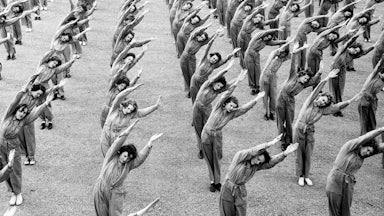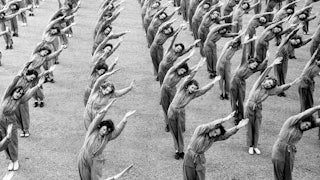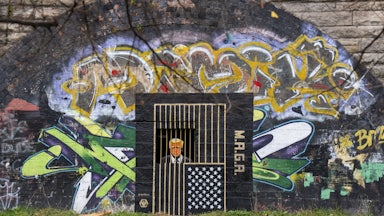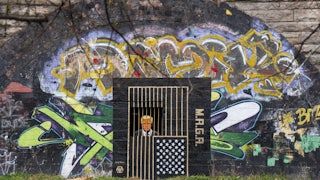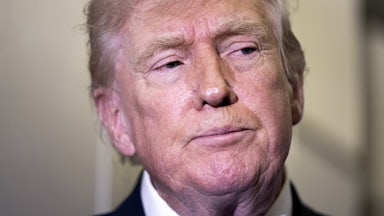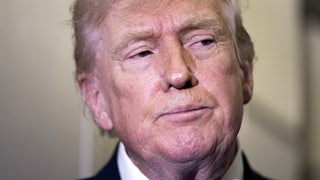In the summer of 2020, as New York City schools prepared to reopen from their Covid-19 closure, the mayor’s office issued a press release intended to assuage the fears of teachers and parents. “New York City is the safest city in America,” Bill DeBlasio said, and in preparation for a return to school the Department of Education had purchased 10,000 portable air purifiers for its classrooms. As per guidelines from the Centers for Disease Control and Prevention, the mayor’s office said, those portable devices would include high-efficiency particulate air filters, or HEPA filters, to increase the amount of fresh air children and teachers would inhale.
The devices that ended up in New York City classrooms—and in urban school districts across the country—would become the subject of controversy. The Intellipure model, built by a company called Healthway and distributed by the well-connected Manhattan real estate company Delos, was said to be 99.99 percent effective in removing particles much smaller than the Covid-19 virus. But that winter, after an Intellipure had been placed in her classroom, a Brooklyn elementary teacher named Sarah Allen began to raise questions on Twitter about how well the units actually worked. To date, the city has granted Delos $64 million in contracts and placed two models in each classroom, but Allen couldn’t find much information about how they had been tested and raised concerns that they didn’t use HEPA filters at all.
Brent Stephens, the head of the Illinois Institute of Technology’s Built Environment Research Group, agreed to test a model in the lab his team had set up for the purpose, measuring the unit’s clear air delivery rate. He ranked the device ninth out of 12 comparable units, in terms of how effectively it cleans the air: As Stephens told me, he considers the 17-pound device’s capacity to be on the “medium-low” end of what he’s seen so far. Delos has aggressively defended its testing and licensing process, arguing that the clean-air delivery rate Stephens measured is a poor metric and pointing to studies that support the Intellipure’s efficacy. But Stephens’s study kicked off a round of scrutiny, most recently an investigation by Gothamist and WNYC that suggested, among other things, that the air purifiers may be less effective over the long term than other systems recommended by the CDC. (In a four-page letter to The New Republic, Delos said the company had reviewed more than 100 devices before settling on the Intellipure and characterized prior reporting as being riddled with “dangerous mistakes.”)
News outlets also questioned the city’s decision to give Delos what appears to be a no-bid contract to keep classrooms safe, granting millions of dollars of federal emergency funds to a company currently valued at $1.25 billion. Air quality experts told NYC Chalkbeat, a local education blog, that filtration systems with the CDC-recommended HEPA filters could be bought for about half the price of what the city paid. Gothamist and WNYC obtained the contracts between the city and Delos and found officials had been given a steep discount on the 157,000 units it purchased after an aggressive 2020 lobbying campaign by Delos, helmed by former members of the mayor’s staff.
When Allen, the Brooklyn teacher, spoke to the media, one of her complaints was that she’d called Delos a handful of times and never received the information she’d requested; the company seemed unresponsive and remote. But its headquarters were just a few miles away in the Meatpacking district, in an open two-story office designed with a custom HVAC system regulating the “temperature gradient,” so employees are never too hot or too cold, and 50 sensors to monitor air quality both inside Delos’s spacious office and on the 1,500-square-foot terrace, alerting occupants when the air outside is most “optimal for human health.” Though the company’s intervention in the New York City school system first attracted attention, the multinational corporation has been building a “wellness real estate” empire for a decade, courting celebrities and creating partnerships through which it up-charges for health-adjacent perks like circadian lighting and aromatherapy ducts. After all, as the founder has noted, there’s a lot of money in the wellness “trend,” which has generated a market worth an estimated $1.5 billion and touched everything from pet food to easy chairs to drinking-water carafes.
If wellness has become a ubiquitous catchall for the kinds of frictionless, health-adjacent perks good money can buy, wellness real estate can make the association between luxury and health particularly concrete: Other companies have developed “health and wellness” office buildings with juice bars and yoga studios, or private residences that automatically check diabetic residents’ vision. It’s a market that has seen significant growth over the last few anxiety-riddled years. Delos has enjoyed great success in this emerging business, spawning an array of subsidiaries and institutes tasked not just with outfitting homes but with determining what makes a building more “well.” It’s a project that’s served the company well during the pandemic, as municipalities and businesses attempt to address the environmental factors that contribute to the spread of disease, sometimes with the help of public funds.
A few years ago Delos was best known for the vitamin C
showers installed in Leonardo DiCaprio’s $8 million condo in New York. Now
it’s selling air purifiers to public school districts and branching out to collaborate
on low-income senior housing. The question of whether circadian lighting can solve systemic inequalities
remains to be seen. But the fast-pivoting company is brilliantly positioned to
take equal advantage of the wealthy’s desire for optimized “lifestyle
environments” with triple-filtered tap water and public
institutions’ increasing need to display a commitment to public health. Some of
what Delos offers—air quality monitoring, access to outdoor space—is common
sense. The posture-supportive floors and energizing
mirrors feel somewhat more frivolous, even as the company invests in the
argument these technologies have a tangible benefit that’s worth paying for.
But what is wellness, anyway, besides a way to monetize the nebulous anxieties
that make people feel tired or stressed out or sick?
To date, Delos claims to have placed 200,000 of the air cleaners it licensed in schools across the country, including in Chicago, Portland, Baltimore, and Miami-Dade. But until recently, the company that trademarked the term “wellness real estate” was primarily selling luxury developments that branded smart home technology as a health benefit. A 2019 project in Australia featured lights that dimmed in the evening to simulate the experience of being outdoors. A pre-Covid partnership with the Mayo Clinic pitched wealthy clients on medical training for yacht crews and on-demand support in case of an outbreak of a disease like Ebola. But the business has expanded to address more public matters of public health through the pandemic, thanks in large part to Delos’s canny development of a network of institutes lending credibility to what it’s selling. The foresight has allowed it to tap into, among other things, an indoor air quality industry that’s expected to bring in $20 billion to the U.S. economy in 2021.
The company has been working up to this point for a decade, since its founder, Paul Scialla, “retired” at 39 from Goldman Sachs in 2012 to focus on Delos full-time and renovated the building in which he lived with his twin brother and co-founder, Peter. When a New York Times reporter toured it, the loft had a juice bar and a heated stone path to the shower that provided “instant foot reflexology”; the home, Paul Scialla said, was like a “24-hour carwash that works on the human body.” Now, through an impressive network of subsidiaries, Delos promises to revolutionize how ordinary people live.
In addition to Delos the real estate company, there is Delos Labs, a research and development arm, which has published papers on how to address “wellness” on construction sites and the impact of air quality on the gastrointestinal biome. There’s the International Well Building Institute, which administers the Well Building Standard, a credentialing program that certifies buildings and businesses for a rather hefty fee. There’s also the Well Living Lab, a partnership with the Mayo Clinic, which operates a facility in Minnesota that studies “indoor health.” All of this is accompanied by a dizzying array of partnerships and special collaborations. IBM is a “founding member” of the Well Living Lab, where sustaining memberships cost $85,000 a year. Jennifer Lopez has shilled for the Well Building Institute on national TV, for a fee. Deepak Chopra and Leonardo DiCaprio sit on the board of Delos. A few months after it won contracts to purify the air in city schools, Delos announced its alliance with “House X,” a startup that intends to “save the American dream” by offering an online marketplace in which consumers can buy smart homes. Delos will be lending technological support and filtering those homes’ air.
These business interests are holistic: In its pitch to sell its air purification systems to the California School Boards Association, Delos highlights its Mayo Clinic collaboration. Delos’s Darwin technology, a proprietary system the company refers to as its “wellness brain,” has been pitched as at once a “white glove” service promising lighting that responds to a user’s sleep schedule and an integrated component of a housing complex in a federal opportunity zone that would bring “health and wellness interventions to Black urban neighborhoods.” In the Delos office, a wall-size screen displays metrics like sound pressure and how many trips have been taken on the building’s stairs.
Aside from sleep monitoring, Delos indicates that Darwin tracks the quality of the air and water in a building. Patents filed by the company suggest a broader set of potential metrics in the future: One system the company patented includes inputs like body mass index, glucose level, amount of perspiration, and the amount of oxygen in the blood. In 2019, Paul Scialla suggested health insurance companies could use the data collected by Delos buildings to cut premiums for people who were investing in their health. Darwin’s terms of service grant the company “non-exclusive, irrevocable, perpetual, worldwide, fully paid, royalty free, sublicensable and transferrable rights” to “fully exploit” whatever nonidentifiable data the system happens to collect—a set of disclaimers Adam Schwartz, an attorney who specializes in surveillance at the Electronic Frontier Foundation, fits into “quite alarming” trends in smart sensor technology. (Delos says identifying and nonidentifying information is stored in physically separate and encrypted databases, and that the “usage and activity” data Darwin collects is only used to provide product support and, “on an aggregate basis,” to support its product research; citing a need to maintain “competitive advantage,” Delos declined to expand on what products might eventually collect information like blood oxygen levels.)
Delos was founded in 2009, but the company really took off in 2012, when Bill Clinton endorsed its mission. At the annual meeting of the Clinton Foundation that year, the former president announced what he described as Delos’s “very cool commitment” to introduce a “well-living standard.” As part of the initiative, Delos announced it would certify 41 wellness-themed hotel rooms and complete construction on a number of projects that would ostensibly “address the importance of human sustainability,” according to a brand-new building standard the company had pioneered. Deepak Chopra was there to endorse the concept, as was Terry McAuliffe, the former chairman of the Democratic Party who would be elected to serve as the governor of Virginia in 2014. In the years after the announcement, Delos donated as much as $1 million to the Clinton Foundation as it developed luxury properties that would act as test kitchens for its projects down the line.
The trademarked Stay Well rooms Delos helped design in hotels like the Orlando Marriott and the MGM Grand, one executive noted, allowed owners to charge as much as one-fifth more for accommodations by implementing relatively cheap changes. Stay Well rooms were cleaned with nontoxic products and ultraviolet lights; they contained dawn simulators and advanced air purifiers and special filtration systems that removed chlorine from shower water. Among Delos’s first standalone development was the “wellness building” recently occupied by DiCaprio: a staggering condo complex with heated reflexology floors made of Siberian oak and anti-microbial coatings on countertops and doors. The building’s air is purified and scented by custom aromatherapy ducts. As well as its vitamin C–infused showers, it has posture-supportive flooring. By 2019, Delos had raised $237 million from investors and said it had handled 1,555 projects in 48 countries; Forbes estimated its yearly revenue at the time was $20 million.
As Delos’s Well Building Institute developed a wellness scoring system, an entire city district in Tampa, Florida, was slated to be stamped with its certification in 2014. Bill Gates’s investment firm and Jeff Wink, the owner of the Tampa Bay Lightnings, committed more than $20 million to the project. The first office building opened in July 2021, with a facade inspired by mangrove roots and the promise of plenty of natural light and fresher air.
The Well Building certification, modeled on the LEED certification for “green” buildings, takes into consideration 11 factors: air, water, nourishment, light, movement, “thermal comfort,” sound, materials, mind, community, and innovation. For a building to become Well-certified, it must pay an enrollment fee of a couple grand, as well as a program fee, determined by square footage, that is capped around $10,000. On-site “performance testing,” in which a reviewer arrives with a suitcase full of air-quality sensors and takes into account the size of plates in a company’s cafeteria, starts at $6,500. Most of the material in the Well Building Institute’s expansive explanation of its process is geared toward employers hoping healthier workers perform better: “An average of 10 percent productivity loss could be attributed to health issues related to poor indoor air quality in office buildings,” the institute notes.
Broadly, the certification standards are a regurgitation of
known quantities augmented by office trends pioneered in Silicon Valley: The
Well Building Institute’s air quality standard mirrors recommendations from the
Environmental Protection Agency and the World Health Organization, and its
water quality measures are consummate with the CDC’s. But in order to receive
a higher level of certification, projects must also include some combination of wonkier
infrastructure like treadmill desks, subsidized wearables for employees to
monitor their physical activity, and smaller plate sizes in cafeterias to
discourage meals considered too big. Buildings seeking the Well designation can
gain additional certification points by, for instance, installing sensors to
continuously gather data about a building’s air quality, which Delos also
sells.
In every crisis there is a business opportunity, and Delos was particularly well positioned to take advantage of an airborne plague. “In a post-Covid environment, we’re really on target,” one executive involved in the Tampa project said. Since March 2020, the company has expanded to touch a staggering number of projects, capitalizing on the needs of public institutions like the New York City school system as much as the bunker fantasies of the rich. During the pandemic, the company introduced a new certification effort called the Well Health-Safety Seal, a less robust version of the Well Building Standard meant to signal a building was taking the health of its occupants seriously. Its criteria include “support handwashing” and “monitor air.” The campaign kicked off with a bizarre advertisement, aired at the Super Bowl and directed by Spike Lee, that aped a public service campaign. Robert DeNiro, Lady Gaga, Venus Williams, and Michael Jordan all appeared in the video, which reportedly cost $100 million. “Look for the Well Health-Safety Seal outside, and feel more confident going inside,” Jennifer Lopez said. The company has also, more recently, launched a separate accreditation for meetings and events.
Delos’s air filtration systems and Darwin have both been integrated into tens of thousands of new developments since the pandemic. In July 2020, Multigreen Properties announced the technology would be built into some 40,000 apartments across three states, and the Tampa project is expected to span over 56 acres when it’s completed. Meanwhile, the company maintains a growing pool of luxury clients. In late 2020, The New York Times profiled one, a 50-year-old startup founder who moved his family into a home outfitted with $300,000 worth of wellness technology. “I have two young kids, and my wife and I wanted to give them not only an environment that is nice to live in, but also one that has the cleanest air, the cleanest water and the right monitoring levels of toxicities,” he said.
A month after that story ran, Delos announced a partnership with a private equity firm that would develop five city blocks in North Philadelphia into a sort of health-and-wellness utopia, a project developers claimed would revitalize a low-income neighborhood and combat inequality by providing historically marginalized communities better health. “A healthy sustainable planet matters, a healthy environment matters, and Black and brown health matters,” the head of the fund said when he announced the project, which would include a primary care office, a senior housing complex, and commercial space. Delos’s Darwin system will be integrated into that project, as well, providing residents with circadian lighting and air purification. Ostensibly it will provide Delos with some data, as well. Notably, few of the neighborhood residents were informed that the Darwin system would be installed in the buildings until a local reporter inquired how they felt about it. It remains unclear whether Delos’s proprietary wellness systems—its light dimmers and ergonomic scoring systems and water filtration technology—will have a significant effect on that population’s long-term health—or who, besides Delos, might study if it does.



